Key to Unit 4 Dealing with Aids
- 格式:doc
- 大小:59.00 KB
- 文档页数:6


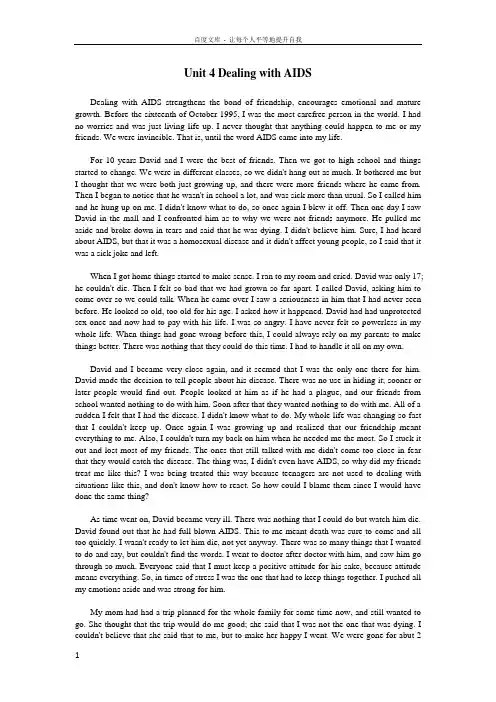
Unit 4 Dealing with AIDSDealing with AIDS strengthens the bond of friendship, encourages emotional and mature growth. Before the sixteenth of October 1995, I was the most carefree person in the world. I had no worries and was just living life up. I never thought that anything could happen to me or my friends. We were invincible. That is, until the word AIDS came into my life.For 10 years David and I were the best of friends. Then we got to high school and things started to change. We were in different classes, so we didn't hang out as much. It bothered me but I thought that we were both just growing up, and there were more friends where he came from. Then I began to notice that he wasn't in school a lot, and was sick more than usual. So I called him and he hung up on me. I didn't know what to do, so once again I blew it off. Then one day I saw David in the mall and I confronted him as to why we were not friends anymore. He pulled me aside and broke down in tears and said that he was dying. I didn't believe him. Sure, I had heard about AIDS, but that it was a homosexual disease and it didn't affect young people, so I said that it was a sick joke and left.When I got home things started to make sense. I ran to my room and cried. David was only 17; he couldn't die. Then I felt so bad that we had grown so far apart. I called David, asking him to come over so we could talk. When he came over I saw a seriousness in him that I had never seen before. He looked so old, too old for his age. I asked how it happened. David had had unprotected sex once and now had to pay with his life. I was so angry. I have never felt so powerless in my whole life. When things had gone wrong before this, I could always rely on my parents to make things better. There was nothing that they could do this time. I had to handle it all on my own.David and I became very close again, and it seemed that I was the only one there for him. David made the decision to tell people about his disease. There was no use in hiding it; sooner or later people would find out. People looked at him as if he had a plague, and our friends from school wanted nothing to do with him. Soon after that they wanted nothing to do with me. All of a sudden I felt that I had the disease. I didn't know what to do. My whole life was changing so fast that I couldn't keep up. Once again I was growing up and realized that our friendship meant everything to me. Also, I couldn't turn my back on him when he needed me the most. So I stuck it out and lost most of my friends. The ones that still talked with me didn't come too close in fear that they would catch the disease. The thing was, I didn't even have AIDS, so why did my friends treat me like this? I was being treated this way because teenagers are not used to dealing with situations like this, and don't know how to react. So how could I blame them since I would have done the same thing?As time went on, David became very ill. There was nothing that I could do but watch him die. David found out that he had full blown AIDS. This to me meant death was sure to come and all too quickly. I wasn't ready to let him die, not yet anyway. There was so many things that I wanted to do and say, but couldn't find the words. I went to doctor after doctor with him, and saw him go through so much. Everyone said that I must keep a positive attitude for his sake, because attitude means everything. So, in times of stress I was the one that had to keep things together. I pushed all my emotions aside and was strong for him.My mom had had a trip planned for the whole family for some time now, and still wanted to go. She thought that the trip would do me good; she said that I was not the one that was dying. I couldn't believe that she said that to me, but to make her happy I went. We were gone for abut 2weeks, and when I came back the first thing I did was go to see David. That was when I saw AIDS for the first time. I didn't even recognize him. David had lost weight, had purple lesions all over his body, and was very pale. He couldn't even get up when he saw me. He was bedridden. I still had to be the strong one and keep everything in. I had brought him stuff from the ocean, his favorite place. We talked about my trip and anything else we could think of. Then he fell asleep because he could no longer stay awake for long periods of time.On the second of May 1996, David was put in the hospital. This gave him the feeling that there was no more hope left, and that he was going to die. I still had to maintain my positive outlook for him. He needed that in me. One day he looked at me and said, "Faye, I am dying; let's accept that and deal with it. I know what I did was wrong and now I have to deal with it. All I want you to do is to remember me, enjoy life and be careful." For the first time in front of him, I cried. I knew that it wouldn't be long before he was gone forever. He shouldn't have to deal with this at such a young age. Towards the end of May he became so sick that the hospital staff had a bubble around him, so he wouldn't catch our bad germs. I hated to see him like that, and every day it became worse. I had come to realize that any day now he would die. At night I would wonder if he would make it through. School was over now, so I spent every hour I could in the hospital. He was everything to me. I felt bad for the time that we had lost and how I wasn't even going to fight for our friendship.The fifth of June, 1996 marked the end of my best friend David's life. He went peacefully. That was a comfort all in its own. In a way I was glad that it was over, for he was no longer in pain. All the emotions that I had held in came rushing out as I realized that I would never see David again. His mother said that I had kept him alive and that she was grateful that I was her son's last friend. It hasn't been a year yet, but I have done so much since then that I am no longer that carefree teenager. I now educate people about AIDS, which to me is keeping David's memory alive. Even though David is gone, he is still with me and always will be in mind and spirit.应对艾滋病抵抗艾滋病可以加深友谊,增进情感交流和促进人们成熟。
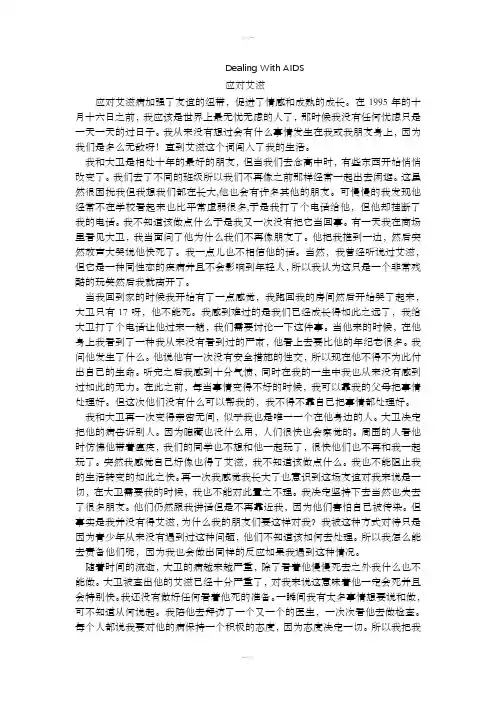
Dealing With AIDS应对艾滋应对艾滋病加强了友谊的纽带,促进了情感和成熟的成长。
在1995年的十月十六日之前,我应该是世界上最无忧无虑的人了,那时候我没有任何忧虑只是一天一天的过日子。
我从来没有想过会有什么事情发生在我或我朋友身上,因为我们是多么无敌呀!直到艾滋这个词闯入了我的生活。
我和大卫是相处十年的最好的朋友,但当我们去念高中时,有些东西开始悄悄改变了。
我们去了不同的班级所以我们不再像之前那样经常一起出去闲逛。
这虽然很困扰我但我想我们都在长大,他也会有许多其他的朋友。
可慢慢的我发现他经常不在学校看起来也比平常虚弱很多,于是我打了个电话给他,但他却挂断了我的电话。
我不知道该做点什么于是我又一次没有把它当回事。
有一天我在商场里看见大卫,我当面问了他为什么我们不再像朋友了。
他把我推到一边,然后突然放声大哭说他快死了。
我一点儿也不相信他的话。
当然,我曾经听说过艾滋,但它是一种同性恋的疾病并且不会影响到年轻人,所以我认为这只是一个非常残酷的玩笑然后我就离开了。
当我回到家的时候我开始有了一点感觉,我跑回我的房间然后开始哭了起来,大卫只有17呀,他不能死。
我感到难过的是我们已经成长得如此之远了,我给大卫打了个电话让他过来一趟,我们需要讨论一下这件事。
当他来的时候,在他身上我看到了一种我从来没有看到过的严肃,他看上去要比他的年纪老很多。
我问他发生了什么。
他说他有一次没有安全措施的性交,所以现在他不得不为此付出自己的生命。
听完之后我感到十分气愤,同时在我的一生中我也从来没有感到过如此的无力。
在此之前,每当事情变得不好的时候,我可以靠我的父母把事情处理好。
但这次他们没有什么可以帮我的,我不得不靠自己把事情都处理好。
我和大卫再一次变得亲密无间,似乎我也是唯一一个在他身边的人。
大卫决定把他的病告诉别人。
因为隐藏也没什么用,人们很快也会察觉的。
周围的人看他时仿佛他带着瘟疫,我们的同学也不想和他一起玩了,很快他们也不再和我一起玩了。
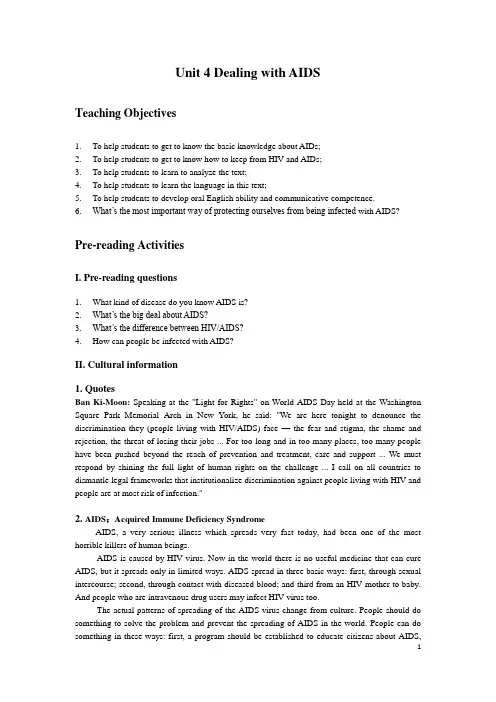
Unit 4 Dealing with AIDSTeaching Objectives1.To help students to get to know the basic knowledge about AIDs;2.To help students to get to know how to keep from HIV and AIDs;3.To help students to learn to analyze the text;4.To help students to learn the language in this text;5.To help students to develop oral English ability and communicative competence.6.What’s the most important way of protecting ourselves from being infected with AIDS? Pre-reading ActivitiesI. Pre-reading questions1.What kind of disease do you know AIDS is?2.What’s the big deal about AIDS?3.What’s the difference between HIV/AIDS?4.How can people be infected with AIDS?II. Cultural information1. QuotesBan Ki-Moon: Speaking at the "Light for Rights" on World AIDS Day held at the Washington Square Park Memorial Arch in New York, he said: "We are here tonight to denounce the discrimination they (people living with HIV/AIDS) face —the fear and stigma, the shame and rejection, the threat of losing their jobs ... For too long and in too many places, too many people have been pushed beyond the reach of prevention and treatment, care and support ... We must respond by shining the full light of human rights on the challenge ... I call on all countries to dismantle legal frameworks that institutionalize discrimination against people living with HIV and people are at most risk of infection."2. AIDS:Acquired Immune Deficiency SyndromeAIDS, a very serious illness which spreads very fast today, had been one of the most horrible killers of human beings.AIDS is caused by HIV virus. Now in the world there is no useful medicine that can cure AIDS, but it spreads only in limited ways. AIDS spread in three basic ways: first, through sexual intercourse; second, through contact with diseased blood; and third from an HIV mother to baby. And people who are intravenous drug users may infect HIV virus too.The actual patterns of spreading of the AIDS virus change from culture. People should do something to solve the problem and prevent the spreading of AIDS in the world. People can do something in these ways: first, a program should be established to educate citizens about AIDS,letting people know what causes it and how it spreads, so that people can know it clearly and prevent it easily, instead of being afraid of it; second, increase scientific technology to fight against AIDS; third, make healthy and civilized social environment, so there will be less sexual intercourse actions, and less drug users.Although AIDS is very horrible, we shouldn't fear, worry or have prejudices about it, we should confront it and fight against this devil.Global ReadingI. Text analysis1.What is the theme of the text?Dealing with AIDS strengthens the bond of friendship and encourages emotional and mature growth.2.What is the style of the text? Give your reasons.The style of the narrative is colloquial and simple because many simple words, colloquial expressions and concise sentences are used, which are easy and smooth to read.Colloquial words:about, cried, go, let, so, sure, thingsSimple or colloquial phrases:blew it off, living life up, feel so bad, had the disease, stuck it out, make it through, etc.II. Structural analysis1.How is this narrative story organized?The narrative is organized in the chronological order with the activities and events related in the true story.2. Work out the structure of the text by completing the table.Paragraph(s) Main idea1 This paragraph gives the instructive message of the story, and makes clearthe specific date when AIDS became known to the writer.2-4 This part provides an account of how the writer came to know the fact that his friend was suffering from AIDS, how he felt, what attitude he adopted,and how others responded to it.5-7 This part tells us that the writer maintained an active and positive attitude towards his friend.8 This paragraph mentions the s pecific date that marked the end of David’slife, describes the writer’s feelings towards David’s death, and tells us howthe writer keeps his friend’s memory alive.Detailed ReadingText IParagraph 1Questions:1) What does the first sentence of Paragraph 1 tell us?It points out the significance of dealing with AIDS,which is the theme of the text.2) The last sentence of Paragraph 1 is a sentence fragment. It is actually part of the preceding sentence. Why does the author separate them from each other?By separating them from each other, the writer succeeds in accentuating the two parts of the sentence with more information. It is precisely for the purpose of emphasis that a sentence is divided into two or more than two parts by means of full stops.Paragraphs 2-4Questions:1)Why did David hang up on the author? (Paragraph 2)Suffering terribly from AIDS, David realized that he was dying,which would make his friend bitterly sad about his illness. And David did not want to run the risk of giving the infectious disease to his best friend. So he cut off all communication with even his best friend.2)How did David, the writer’s friend, catch AIDS? (Paragraph 3)David had had unprotected sex once. Thus, he caught AIDS.3) What attitude did the writer adopt towards David? (Paragraph 4)The writer adopted a friendly attitude towards David. Because their friendship meant everything to David. He couldn’t turn his back on David when he needed him the most.4) How did other people react to David’s ill ness when it was made known? (Paragraph 4)Other people looked at him as if he had a plague, and the writer’s and David’s friends from school wanted nothing to do with him and even with the writer.Paragraphs 5-7Questions:1) What did David say to the writer one day in the hospital? (Paragraph 7)David said to the writer one day in the hospital, ―Faye, I am dying; let’s accept that and deal with it. I know what I did was wrong and now I have to deal with it. All I want you to do is to remember me, e njoy life and be careful.‖2) How did the writer take care of his friend David? (Paragraph 5/6/7)The writer maintained an active attitude for the sake of his friend David and showed great concern for him. To be more specific, the writer contained his emotions in front of his friend; he went to see one doctor after another with him, brought him stuff from the ocean—his favorite place; he spent every hour he could accompanying his friend in the hospital, where David was being treated until his last breath.Paragraph 8Questions1) How did the writer feel about his friend’s death?The writer had mixed feelings. In a way he was glad that David was no longer in pain. But all the emotions came rushing out as he realized that he would never see David again.2) How does the writer keep David’s memory alive?The writer educates people about AIDS. It is in this positive way that he keeps David’s memory alive.Further EnhancementText IILead-in Questions1. How can we prevent AIDS according to your knowledge?2. What do you think we can do to improve public awareness of AIDS?Notes1. Centers for Disease Control (Paragraph 2): Centers for Disease Control and Prevention (CDC), agency of the United States Public Health Service.2. intravenous needles (Paragraph 9): needles used for the injection into a vein3. hemophiliacs (Paragraph 3): 血友病患者4. Rock Hudson (Paragraph 4): American actor noted for his good looks and movie roles during the 1950s and 1960s and popular television series in the 1970s. Hudson was one of the first known Hollywood celebrities to die of AIDS-related complications.5. Magic Johnson (Paragraph 4): byname of Earvin Johnson, Jr., American basketball player. In the fall of 1991 Johnson announced that he had tested positive for the virus that causes AIDS.6. Arthur Ashe(Paragraph 4): American tennis player, the first black winner of a major men’s singles championship. In April 1992 he revealed that he had become infected with the virus that causes AIDS, probably through a tainted blood transfusion.7. HTLV (Paragraph 5): acronym for human T-cell lymphotropic virus 艾滋病病毒8. macrophages (Paragraph 6): 巨噬细胞9. thrush (Paragraph 7): 鹅口疮10. Pneumocystis carinii (Paragraph 8): 卡氏肺袍子虫11. Kaposi’s sarcoma (Paragraph 8): 卡波济氏肉瘤:一种多病灶恶性新生血管增值症12. semen (Paragraph 9): reproductive fluid of males 精液13. saliva (Paragraph 10): colorless liquid secreted into the mouth by glands 唾液14. placenta (Paragraph 10): organ in the womb of pregnant mammals nourishing the foetus (胚胎,胎儿) through umbilical cord (脐带) and eliminating its waste products胎盘15. invasive procedures (Paragraph 10): a series of actions in which the surgeon make usuallylarge incisions16. abstinence (Paragraph 11): the state of refraining from food, alcohol, etc., but in this text esp.from sex17. monogamous (Paragraph 11): in the practice or state of being married to one person at a time18. latex condoms (Paragraph 11): contraceptive sheaths made of rubber and worn by menQuestions for discussion1. What is the function of the human body’s immune system?2. What fact about the disease AIDS is the public aware of?3. How does the virus damage the human immune system?4. What happens after one contracts the AIDS virus?5. What is an opportunistic infection?6. How is AIDS spread?7. Why should health care workers who perform invasive procedures be tested for the AIDS virus?8. What should we do to protect ourselves from AIDS?Key to Questions for discussion1. The system is responsible for fighting disease-causing substances that have entered the body.2. The disease is spreading quickly and anyone can be at risk.3. It destroys central white blood cells that are essential for human immune system.4. Some people may act as carriers, remaining healthy but still able to infect others. The average time for AIDS to fully manifest itself is one to two years.5. An infection that normally does not cause diseases but produces devastating and eventually lethal diseases when the body is unable to fight off infection, as in AIDS and certain other diseases.6. Scientists have identified three ways that HIV infections spread: sexual intercourse with an infected person, contact with contaminated blood, and transmission from an infected mother to her child.7. Since their part of the body is entered, they are more likely to contract disease.8. (This is an open question for students to answer.)Memorable QuotesAppreciate the rhetoric device used in “Joy and Temperance and Repose Slam the door on the doctor’s nose.”Guidance: Mary Baker Eddy (1821–1910) founded the Christian Science movement. She advocated Christian Science as a spiritual practical solution to health and moral issues. According to Christian Science, mortal mind refers to a belief that life, substance, and intelligence are of matter. In the sentence ―Joy and Temperance and Repose Slam the door on the doctor’s nose‖, personification is applied. Here ―Joy and Temperance and Repose‖ is the subject of the sentence which actually describes a state of mind that helps one to keep healthy.1.Disease is the experience of so-called mortal mind. It is fear made manifest on the body.— Mary Baker EddyParaphrase: Disease is the expression of thought externalized which believes that the mind would eventually die. The fear of the death is shown in the form of disease on the body. manifest: to show or demonstrate clearlye.g. The problem of governance manifested itself in the economic crisis.2.Joy and Temperance and Repose Slam the doo r on the doctor’s nose.— Elizabeth Cady Stanton Paraphrase: To keep joyful, self-restrained and peaceful is to keep doctor away.slam the door in someone's nose: (slam the door in someone's face) an idiom with the figurative meaning of suddenly withdrawing an opportunity from someone.e.g.His bad manners in the interview effectively slammed the door in his face for future employment.。
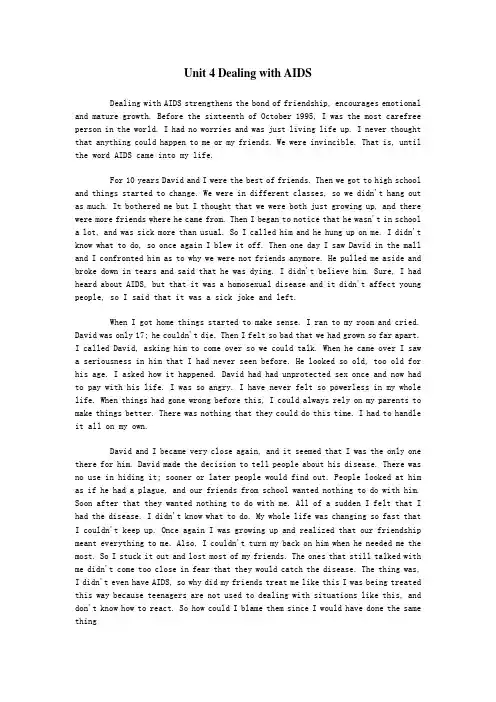
Unit 4 Dealing with AIDSDealing with AIDS strengthens the bond of friendship, encourages emotional and mature growth. Before the sixteenth of October 1995, I was the most carefree person in the world. I had no worries and was just living life up. I never thought that anything could happen to me or my friends. We were invincible. That is, until the word AIDS came into my life.For 10 years David and I were the best of friends. Then we got to high school and things started to change. We were in different classes, so we didn't hang out as much. It bothered me but I thought that we were both just growing up, and there were more friends where he came from. Then I began to notice that he wasn't in school a lot, and was sick more than usual. So I called him and he hung up on me. I didn't know what to do, so once again I blew it off. Then one day I saw David in the mall and I confronted him as to why we were not friends anymore. He pulled me aside and broke down in tears and said that he was dying. I didn't believe him. Sure, I had heard about AIDS, but that it was a homosexual disease and it didn't affect young people, so I said that it was a sick joke and left.When I got home things started to make sense. I ran to my room and cried. David was only 17; he couldn't die. Then I felt so bad that we had grown so far apart.I called David, asking him to come over so we could talk. When he came over I sawa seriousness in him that I had never seen before. He looked so old, too old for his age. I asked how it happened. David had had unprotected sex once and now had to pay with his life. I was so angry. I have never felt so powerless in my whole life. When things had gone wrong before this, I could always rely on my parents to make things better. There was nothing that they could do this time. I had to handle it all on my own.David and I became very close again, and it seemed that I was the only one there for him. David made the decision to tell people about his disease. There was no use in hiding it; sooner or later people would find out. People looked at him as if he had a plague, and our friends from school wanted nothing to do with him. Soon after that they wanted nothing to do with me. All of a sudden I felt that I had the disease. I didn't know what to do. My whole life was changing so fast that I couldn't keep up. Once again I was growing up and realized that our friendship meant everything to me. Also, I couldn't turn my back on him when he needed me the most. So I stuck it out and lost most of my friends. The ones that still talked with me didn't come too close in fear that they would catch the disease. The thing was, I didn't even have AIDS, so why did my friends treat me like this I was being treated this way because teenagers are not used to dealing with situations like this, and don't know how to react. So how could I blame them since I would have done the same thingAs time went on, David became very ill. There was nothing that I could do but watch him die. David found out that he had full blown AIDS. This to me meant death was sure to come and all too quickly. I wasn't ready to let him die, not yet anyway. There was so many things that I wanted to do and say, but couldn't find the words. I went to doctor after doctor with him, and saw him go through so much. Everyone said that I must keep a positive attitude for his sake, because attitude means everything. So, in times of stress I was the one that had to keep things together.I pushed all my emotions aside and was strong for him.My mom had had a trip planned for the whole family for some time now, and still wanted to go. She thought that the trip would do me good; she said that I was not the one that was dying. I couldn't believe that she said that to me, but to make her happy I went. We were gone for abut 2 weeks, and when I came back the first thing I did was go to see David. That was when I saw AIDS for the first time. I didn't even recognize him. David had lost weight, had purple lesions all over his body, and was very pale. He couldn't even get up when he saw me. He was bedridden. I still had to be the strong one and keep everything in. I had brought him stuff from the ocean, his favorite place. We talked about my trip and anything else we could think of. Then he fell asleep because he could no longer stay awake for long periods of time.On the second of May 1996, David was put in the hospital. This gave him the feeling that there was no more hope left, and that he was going to die. I still had to maintain my positive outlook for him. He needed that in me. One day he looked at me and said, "Faye, I am dying; let's accept that and deal with it. I know what I did was wrong and now I have to deal with it. All I want you to do is to remember me, enjoy life and be careful." For the first time in front of him, I cried. I knew that it wouldn't be long before he was gone forever. He shouldn't have to deal with this at such a young age. Towards the end of May he became so sick that the hospital staff had a bubble around him, so he wouldn't catch our bad germs. I hated to see him like that, and every day it became worse. I had come to realize that any day now he would die. At night I would wonder if he would make it through. School was over now, so I spent every hour I could in the hospital. He was everything to me.I felt bad for the time that we had lost and how I wasn't even going to fight for our friendship.The fifth of June, 1996 marked the end of my best friend David's life. He went peacefully. That was a comfort all in its own. In a way I was glad that it was over, for he was no longer in pain. All the emotions that I had held in came rushing out as I realized that I would never see David again. His mother said that I had kept him alive and that she was grateful that I was her son's last friend. It hasn't been a year yet, but I have done so much since then that I am no longer that carefree teenager. I now educate people about AIDS, which to me is keeping David's memory alive. Even though David is gone, he is still with me and always will be in mind and spirit.应对艾滋病抵抗艾滋病可以加深友谊,增进情感交流和促进人们成熟。
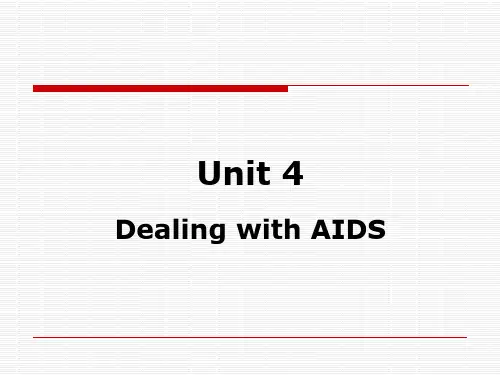
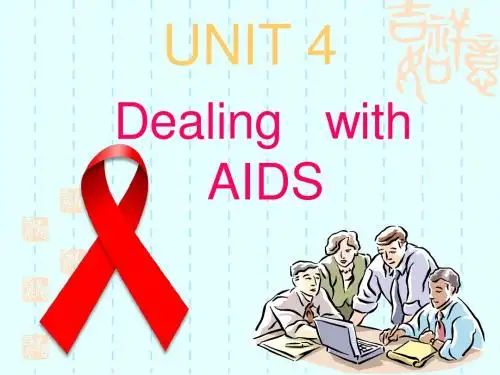
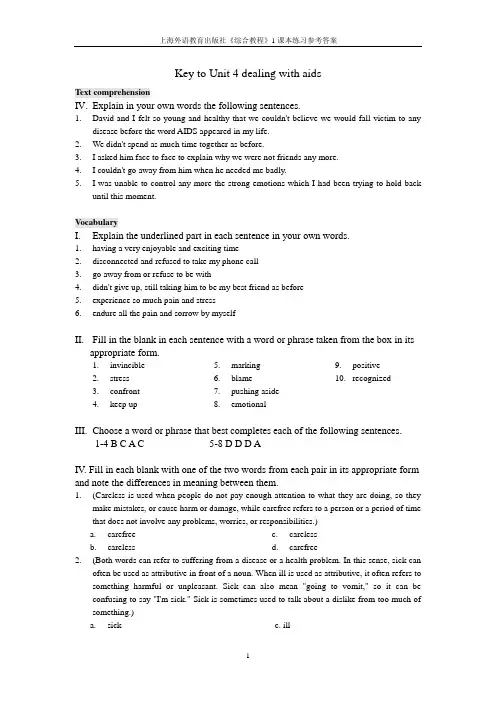
Key to Unit 4 dealing with aidsText comprehensionIV.Explain in your own words the following sentences.1.David and I felt so young and healthy that we couldn't believe we would fall victim to anydisease before the word AIDS appeared in my life.2.We didn't spend as much time together as before.3.I asked him face to face to explain why we were not friends any more.4.I couldn't go away from him when he needed me badly.5.I was unable to control any more the strong emotions which I had been trying to hold backuntil this moment.VocabularyI.Explain the underlined part in each sentence in your own words.1.having a very enjoyable and exciting time2.disconnected and refused to take my phone call3.go away from or refuse to be with4.didn't give up, still taking him to be my best friend as before5.experience so much pain and stress6.endure all the pain and sorrow by myselfII.Fill in the blank in each sentence with a word or phrase taken from the box in its appropriate form.1.invincible2.stress3.confront4.keep up5.marking6.blame7.pushing aside8.emotional9.positive10.recognizedIII.Choose a word or phrase that best completes each of the following sentences.1-4 B C A C 5-8 D D D AIV. Fill in each blank with one of the two words from each pair in its appropriate form and note the differences in meaning between them.1.(Careless is used when people do not pay enough attention to what they are doing, so theymake mistakes, or cause harm or damage, while carefree refers to a person or a period of time that does not involve any problems, worries, or responsibilities.)a.carefreeb.carelessc.carelessd.carefree2.(Both words can refer to suffering from a disease or a health problem. In this sense, sick canoften be used as attributive in front of a noun. When ill is used as attributive, it often refers to something harmful or unpleasant. Sick can also mean "going to vomit," so it can be confusing to say "I'm sick." Sick is sometimes used to talk about a dislike from too much of something.)a.sick c. illb.sick d. ill3.(Disease refers to any kind of bad health or is an illness that affects people, animals or plants.It does not have any implications as to whether the sickness is acute or chronic, mild or harsh, or long or short in duration. Plague specifically refers to a very infectious disease that spreads quickly over a wide area and kills large numbers of people.)a.disease c. diseaseb.plague d. plague4.(Keep, among its many different uses, can mean "cause something or somebody to continueto do something," or "have without the need of returning." Maintain means "continue to have something and do not let it stop or grow weaker," or "keep something in good condition by regularly checking it and repairing it when necessary.")a.keep c. maintainb.keep d. maintainV.Give a synonym or an antonym of the word underlined in each sentence in the sense it is used.1.tighten (intensify, enhance)2.unhappy (wretched, miserable, cheerless)3.quickly (rapidly, swiftly)4.negative (doubtful, pessimistic, uncertain)5.benefit (profit, advantage)6.gain (increase, gather)7.cautious (alert, watchful)8.beginning (start, commencement)VI.Fill in the blank in each sentence with an appropriate form of the given capitalized word in brackets.1.unfavourableanisation3.worthless4.imperfect5.strengthening6.ashamed7.gratitude8.youthGrammarI. Put in any, each, every, some or one of their compounds.1. every (We use “each” when we talk about people or things as individuals and we use “every”when we think of them as a group.)2. everything3. anywhere (“Anywhere” in an affirmative sentence means “in any place; no matter where”)4. everyday5. somehow; anything6. anyone; someone7. some8. somewhereII. Explain the underlined part in each sentence in your own words.(The nouns in the underlined parts are all normally uncountable, but they are used as countable nouns here.)1. a kind of seriousness2. a kind of devotion3.people that cause joy4.the water of the stated river5. a kind of zeal6.many kinds of tea7.something that distracted8.something that made him disappointedIII. Choose the best answer.1-4 C C B C 5-8 DACBIV. Insert suitable prepositions in the following sentences.1.in2.since3.behind4.in; by5.in ("Deal in" means "buy and sell.")6.to; for7.by; for; by; in/under; of8.by; of; in; around9.to; in; with; on; in10.under ("Under the weather" means "slightly unwell or in low spirits.")V. Correct the errors, where found, in the following sentences.1.√(We use "between" when we talk about comparisons.)2.above →over (We use "over," not "above," when we say that something covers somethingelse and is in contact with it.)3.under →below (We use "below" when one thing is not directly under the other.)4.through →across5.√("Over the hill" means "too old.")6.on →in7.√8.in →atTranslationI. Translate the following sentences into Chinese.1. We were in different classes, so we didn't hang out as much.我们分在不同的班级,所以就不再那么经常厮混在一起了。
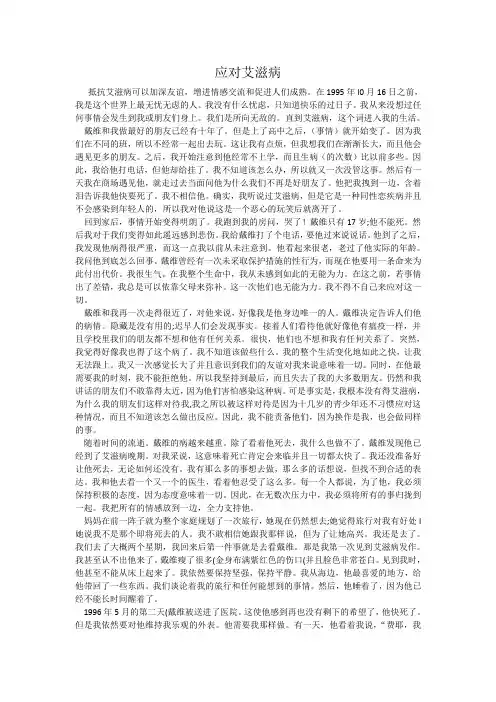
应对艾滋病抵抗艾滋病可以加深友谊,增进情感交流和促进人们成熟。
在1995年l0月16日之前,我是这个世界上最无忧无虑的人。
我没有什么忧虑,只知道快乐的过日子。
我从来没想过任何事情会发生到我或朋友们身上。
我们是所向无敌的。
直到艾滋病,这个词进入我的生活。
戴维和我做最好的朋友已经有十年了。
但是上了高中之后,(事情)就开始变了。
因为我们在不同的班,所以不经常一起出去玩。
这让我有点烦,但我想我们在渐渐长大,而且他会遇见更多的朋友。
之后,我开始注意到他经常不上学,而且生病(的次数)比以前多些。
因此,我给他打电话,但他却给挂了。
我不知道该怎么办,所以就又一次没管这事。
然后有一天我在商场遇见他,就走过去当面问他为什么我们不再是好朋友了。
他把我拽到一边,含着泪告诉我他快要死了。
我不相信他。
确实,我听说过艾滋病,但是它是一种同性恋疾病并且不会感染到年轻人的,所以我对他说这是一个恶心的玩笑后就离开了。
回到家后,事情开始变得明朗了。
我跑到我的房问,哭了!戴维只有17岁;他不能死。
然后我对于我们变得如此遥远感到悲伤。
我给戴维打了个电话,要他过来说说话。
他到了之后,我发现他病得很严重,而这一点我以前从未注意到。
他看起来很老,老过了他实际的年龄。
我问他到底怎么回事。
戴维曾经有一次未采取保护措施的性行为,而现在他要用一条命来为此付出代价。
我很生气。
在我整个生命中,我从未感到如此的无能为力。
在这之前,若事情出了差错,我总是可以依靠父母来弥补。
这一次他们也无能为力。
我不得不自己来应对这一切。
戴维和我再一次走得很近了,对他来说,好像我是他身边唯一的人。
戴维决定告诉人们他的病情。
隐藏是没有用的;迟早人们会发现事实。
接着人们看待他就好像他有瘟疫一样,并且学校里我们的朋友都不想和他有任何关系。
很快,他们也不想和我有任何关系了。
突然,我觉得好像我也得了这个病了。
我不知道该做些什么。
我的整个生活变化地如此之快,让我无法跟上。
我又一次感觉长大了并且意识到我们的友谊对我来说意味着一切。
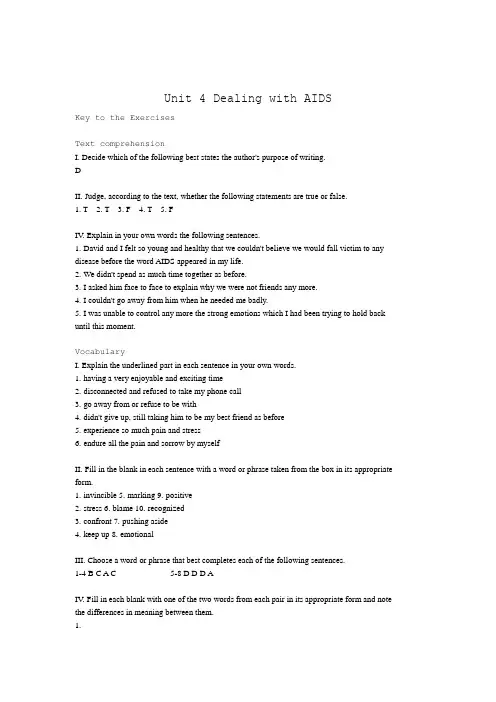
Unit 4 Dealing with AIDSKey to the ExercisesText comprehensionI. Decide which of the following best states the author's purpose of writing.DII. Judge, according to the text, whether the following statements are true or false.1. T2. T3. F4. T5. FIV. Explain in your own words the following sentences.1.David and I felt so young and healthy that we couldn't believe we would fall victim to any disease before the word AIDS appeared in my life.2.We didn't spend as much time together as before.3.I asked him face to face to explain why we were not friends any more.4.I couldn't go away from him when he needed me badly.5.I was unable to control any more the strong emotions which I had been trying to hold back until this moment.VocabularyI. Explain the underlined part in each sentence in your own words.1.having a very enjoyable and exciting time2.disconnected and refused to take my phone call3.go away from or refuse to be with4.didn't give up, still taking him to be my best friend as before5.experience so much pain and stress6.endure all the pain and sorrow by myselfII. Fill in the blank in each sentence with a word or phrase taken from the box in its appropriate form.1.invincible 5.marking 9.positive2.stress 6.blame 10.recognized3.confront 7.pushing aside4.keep up 8.emotionalIII. Choose a word or phrase that best completes each of the following sentences.1-4 B C A C 5-8 D D D AIV. Fill in each blank with one of the two words from each pair in its appropriate form and note the differences in meaning between them.1.a.carefree c.carelesscarefreed.careless b.2.a.sick c. illb.sick d. ill3.a.disease c. diseaseb.plague d. plague4.a.keep c. maintainb.keep d. maintainV. Give a synonym or an antonym of the word underlined in each sentence in the sense it is used.1.tighten (intensify, enhance)2.unhappy (wretched, miserable, cheerless)3.quickly (rapidly, swiftly)4.negative (doubtful, pessimistic, uncertain)5.benefit (profit, advantage)6.gain (increase, gather)7.cautious (alert, watchful)8.beginning (start, commencement)VI. Fill in the blank in each sentence with an appropriate form of the given capitalized word in brackets.1.unfavourable 5.strengtheninganisation 6.ashamed3.worthless 7.gratitude4.imperfect 8.youthGrammarI. Put in any, each, every, some or one of their compounds.1. every 5. somehow; anything2. everything 6. anyone; someone3. anywhere 7. some4. everyday 8. somewhereII. Explain the underlined part in each sentence in your own words.1.a kind of seriousness2.a kind of devotion3.people that cause joy4.the water of the stated river5.a kind of zeal6.many kinds of tea7.something that distracted8.something that made him disappointedIII. Choose the best answer.1-4 CCBC 5-8 DACBIV. Insert suitable prepositions in the following sentences.1.in 6.to; for2.since 7.by; for; by; in/under; of3.behind 8.by; of; in; around4.in; by 9.to; in; with; on; in5.in 10.underV. Correct the errors, where found, in the following sentences.1.√2.above →over3.under →below4.through →across5.√6.on →in7.√8.in →atTranslationI. Translate the following sentences into Chinese.1. 我们分在不同的班级,所以就不再那么经常厮混在一起了。
Key to Unit 4Text comprehensionIV.Explain in your own words the following sentences.1.David and I felt so young and healthy that we couldn't believe we would fall victim to anydisease before the word AIDS appeared in my life.2.We didn't spend as much time together as before.3.I asked him face to face to explain why we were not friends any more.4.I couldn't go away from him when he needed me badly.5.I was unable to control any more the strong emotions which I had been trying to hold backuntil this moment.VocabularyI.Explain the underlined part in each sentence in your own words.1.having a very enjoyable and exciting time2.disconnected and refused to take my phone call3.go away from or refuse to be with4.didn't give up, still taking him to be my best friend as before5.experience so much pain and stress6.endure all the pain and sorrow by myselfII.Fill in the blank in each sentence with a word or phrase taken from the box in its appropriate form.1.invincible2.stress3.confront4.keep up5.marking6.blame7.pushing aside8.emotional9.positive10.recognizedIII.Choose a word or phrase that best completes each of the following sentences.1-4 B C A C 5-8 D D D AIV. Fill in each blank with one of the two words from each pair in its appropriate form and note the differences in meaning between them.1.(Careless is used when people do not pay enough attention to what they are doing, so theymake mistakes, or cause harm or damage, while carefree refers to a person or a period of time that does not involve any problems, worries, or responsibilities.)a.carefreeb.carelessc.carelessd.carefree2.(Both words can refer to suffering from a disease or a health problem. In this sense, sick canoften be used as attributive in front of a noun. When ill is used as attributive, it often refers to something harmful or unpleasant. Sick can also mean "going to vomit," so it can be confusing to say "I'm sick." Sick is sometimes used to talk about a dislike from too much of something.)a.sick c. illb.sick d. ill3.(Disease refers to any kind of bad health or is an illness that affects people, animals or plants.It does not have any implications as to whether the sickness is acute or chronic, mild or harsh, or long or short in duration. Plague specifically refers to a very infectious disease that spreads quickly over a wide area and kills large numbers of people.)a.disease c. diseaseb.plague d. plague4.(Keep, among its many different uses, can mean "cause something or somebody to continueto do something," or "have without the need of returning." Maintain means "continue to have something and do not let it stop or grow weaker," or "keep something in good condition by regularly checking it and repairing it when necessary.")a.keep c. maintainb.keep d. maintainV.Give a synonym or an antonym of the word underlined in each sentence in the sense it is used.1.tighten (intensify, enhance)2.unhappy (wretched, miserable, cheerless)3.quickly (rapidly, swiftly)4.negative (doubtful, pessimistic, uncertain)5.benefit (profit, advantage)6.gain (increase, gather)7.cautious (alert, watchful)8.beginning (start, commencement)VI.Fill in the blank in each sentence with an appropriate form of the given capitalized word in brackets.1.unfavourableanisation3.worthless4.imperfect5.strengthening6.ashamed7.gratitude8.youthGrammarI. Put in any, each, every, some or one of their compounds.1. every (We use “each” when we talk about people or things as individuals and we use “every”when we think of them as a group.)2. everything3. anywhere (“Anywhere” in an affirmative sentence means “in any place; no matter where”)4. everyday5. somehow; anything6. anyone; someone7. some8. somewhereII. Explain the underlined part in each sentence in your own words.(The nouns in the underlined parts are all normally uncountable, but they are used as countable nouns here.)1. a kind of seriousness2. a kind of devotion3.people that cause joy4.the water of the stated river5. a kind of zeal6.many kinds of tea7.something that distracted8.something that made him disappointedIII. Choose the best answer.1-4 C C B C 5-8 DACBIV. Insert suitable prepositions in the following sentences.1.in2.since3.behind4.in; by5.in ("Deal in" means "buy and sell.")6.to; for7.by; for; by; in/under; of8.by; of; in; around9.to; in; with; on; in10.under ("Under the weather" means "slightly unwell or in low spirits.")V. Correct the errors, where found, in the following sentences.1.√(We use "between" when we talk about comparisons.)2.above →over (We use "over," not "above," when we say that something covers somethingelse and is in contact with it.)3.under →below (We use "below" when one thing is not directly under the other.)4.through →across5.√("Over the hill" means "too old.")6.on →in7.√8.in →atTranslationI. Translate the following sentences into Chinese.1. We were in different classes, so we didn't hang out as much.我们分在不同的班级,所以就不再那么经常厮混在一起了。